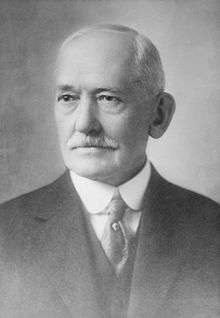Johnson C. Smith
| Johnson C. Smith | |
|---|---|
 | |
| Born |
27 October 1844 Amwell, Pennsylvania |
| Died |
20 August 1919 Pittsburgh, Pennsylvania |
| Nationality | American |
| Occupation | businessman |
| Known for | street railway construction, namesake of Johnson C. Smith University |
Johnson Crayne Smith (27 October 1844-20 August 1919) was an early 20th-century businessman from Pittsburgh and the namesake of Johnson C. Smith University.
After graduating from Washington and Jefferson College in Washington, Pennsylvania, Smith operated a drug store in McKeesport, Pennsylvania.[1] He later became one of the pioneers of street railway construction and served as a director of the People’s Bank in McKeesport.[1] He owned a substantial amount of real estate and co-founded the McKeesport Tin Plate Company.[1]
After he died in 1919, his wife, Jane Berry Smith of Pittsburgh gave funds to build a theological dormitory, a science hall, a teachers' cottage, and a memorial gate at the Biddle University, an historically black university in Charlotte, North Carolina.[2] She also donated significant sum to the endowment in memory of her late husband.[2]
In appreciation, the Biddle University trustees changed the name of the university to Johnson C. Smith University. The change was made official on March 1, 1923.[2] The university's seminary, the Biddle Memorial Institute, was also renamed the Johnson C. Smith Theological Seminary, which is now part of the Interdenominational Theological Center.[3][4]
Biography
For many years a prominent merchant and man of affairs of McKeesport, the last years of Mr. Smith's long life were spent in Pittsburgh, where he acquired many interests and had many points of contact with the life of the city. He was one of the best known drug merchants of this district for four decades, and there was scarcely a progressive movement in his city with which he was not identified, either as a leader or supporter of the project. Mr. Smith was an able business man of broad executive talent, but has daily life had important interests beyond the world of trade, and his religious, philanthropic, and charitable activities were productive of widespread good. He was held in unwavering regard by his associates and friends for personal qualities of mind and heart that found their expression in quiets deeds of good will and brotherhood, and in his bearing of simple democracy.
Johnson C. Smith was a son of James and Margaret (Johnson) Smith, of one of Washington county's early families, the grandfather, Dennis Smith, a soldier of the Revolution, being one of the pioneer settlers. Johnson C. Smith, was born in Amwell township, Washington county, Pa., Oct. 27, 1844, and died in Pittsburgh, in early young manhood, he entered the retail drug business in McKeesport, and for forty years continued in this field with steady prosperity. His establishment was known as the Hiawatha Drug Store, and under his wise management this became one of the most popular pharmacies of the city, noted for the careful, courteous, capable attention its patrons received. He extended his interests into the broader lines of industry and public utilities, and became a potent factor in a number of leading enterprises. He was chairman of the executive committee of the McKeesport Tin Plate Company, second vice-president of the People's Bank of McKeesport, an organizer and president of the McKeesport Street Railway Company, and an officer and director of the McKeesport Gas Company. In practical affairs he was the spirit of forceful initiative, wise in counsel and decisive in action, and under his leadership movements of value and benefit to the community were consummated.
Mr. Smith made Pittsburgh his home in 1910, and brought his membership to the Third Presbyterian Church. He was active in denominational work, served on the board of the Association for the Improvement of the Poor, both of Pittsburgh. His contributions to their work were of his means as well as of his time and service, and in this, as in all of his beneficent work, he sought the method by which the greatest good might be accomplished with the least public notice.
Mr. Smith married, Oct. 24, 1883, Jane Morrow Berry, daughter of James H. and Jane (Morrow) Berry. Mrs. Smith is a member of the board of the Association for the Improvement of the Poor, the Board of the Home for Aged Protestants, men and couples, of Wilkinsburg, the board of directors of the East End Young Women's Christian Association, and the Twentieth Century Club. Their home was Mr. Smith's chief joy, and there he spent his happiest hours. Mrs. Smith, who was always his associate in good works, continues her interest in and support of the organizations whose work they had long furthered.
References
- 1 2 3 "TITLE: Mr. Johnson C. Smith". Digital Archives. Inez Moore Parker Archives and Research Center at Johnson C. Smith University. June 2000.
- 1 2 3 "History of Johnson C. Smith University". Johnson C. Smith University.
- ↑ "Johnson C. Smith Theological Seminary". PC(USA) - Office of Theological Education.
- ↑ "JOHNSON C. SMITH THEOLOGICAL SEMINARY". ITC.Edu. 2005.
Bibliography
Fleming, G.T. (1922). History of Pittsburgh and Environs: Biographical. American Historical Society.